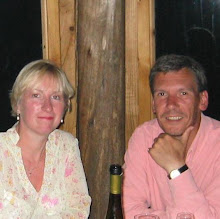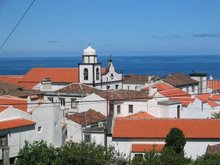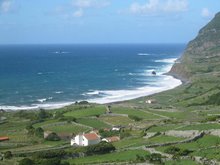 |
| Newton May |
Friday, 23 September 2011
Lookalike
Surely I can't be the only one to have noticed the uncanny resemblance between aging rocker Brian May and pioneering English scientist Sir Isaac Newton. I wonder if by any chance they're related - I think we should be told.
What's that barnet all about Brian? Isaac had an excuse. You don't.
Thursday, 22 September 2011
Distinguished visitor
Tomorrow, Friday 23 September 2011, Fajã Grande plays host to no less a personage than His Excellency Prof. Aníbal Cavaco Silva, the President of Portugal.

There's going to be a grande jantar (piss-up) at the balneareio hosted jointly by the presidentes of the câmaras municipais of Lajes das Flores and Santa Cruz das Flores. That requires some explanation.
First, the venue. Balneareio translates literally as "bathing facility". It can apply to the showers in a sports stadium but in FG means the bit where you swim in the sea (there being no beach as such) and more particularly the bar-restaurant there where you get your beers, ice creams and burgers on a hot summer's afternoon.
Often booked for island weddings, the Balneareio is run by a jolly chap called José Diamantino and his wife with the assistance of a team of local teenage girls. I can picture Senhora JD lining them up (inc. JD ele mesmo who will be ordered to shave for the occasion) to give them a sharp lecture on minding their Ps & Qs and telling the local lags usually to be found lined up at the bar shouting at each other that they'll need to make themselves scarce (rather like Fawlty telling the ladies they wouldn't be welcome at the Gourmet Night.)
Second, the hosts. There are, incredibly for an island of fewer than 4,000 people, two separate câmaras municipais (local authorities) on Flores - Santa Cruz (the north half of the island) and Lajes (the south half). Beaten only to the bottom spot by Corvo (pop. 400), they are respectively the third and second smallest CMs in Portugal and they don't get on with each other.
For a start, there's a territorial dispute. As long ago as the 18th century, worthies were sent to adjudicate but unfortunately they only fixed the boundary as being an imaginary line between the mouths of two rivers on the west and east coasts of Flores. In a pre-GPS era, that left not so much wriggle as thrashing about epileptically room as to where that line actually ran through the island's unhelpfully irregular interior.
That picture of JL sitting magisterially on his throne on the pier at Lajes glaring King Canute style at the waves is scanned from an edition of the Lajes Boletim Municipal which caused gales of mirth locally - had His Highness been borne aloft in his chair on the shoulders of the vereadores (councillors) from the White House down the hill to the sea, asked one wag? Presumably, the presidente of SC will be bringing his chair to the presidential jantar tomorrow - I can just picture them jostling their chairs against each other to get closer to His Excellency.
I must say, I'd been expecting the village to be swarming with Feds today, sweeping the place for security and making sure Frank's cows were safely penned in so they couldn't shite on the street and risk splattering the presidential limo. But no sign - the skies are darkening and the wind's getting up. Perhaps SATA have cancelled and the whole thing's off. I'll let you know what happens.
Incidentally - in case anyone's in any doubt about my British sense of humour - I consider it to be a GOOD THING that Frank's cows are allowed to shite on the street here. There's probably some humourless nanny state somewhere (Scotland, probably) where that sort of thing is banned. Don't get me started.
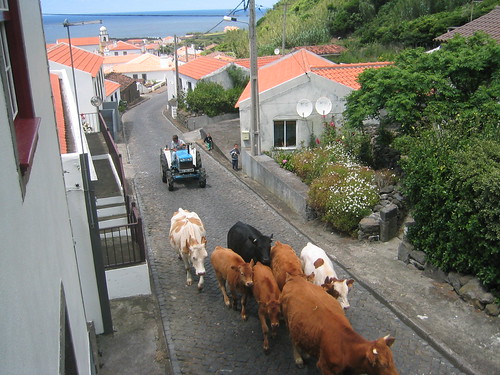

There's going to be a grande jantar (piss-up) at the balneareio hosted jointly by the presidentes of the câmaras municipais of Lajes das Flores and Santa Cruz das Flores. That requires some explanation.
First, the venue. Balneareio translates literally as "bathing facility". It can apply to the showers in a sports stadium but in FG means the bit where you swim in the sea (there being no beach as such) and more particularly the bar-restaurant there where you get your beers, ice creams and burgers on a hot summer's afternoon.
Often booked for island weddings, the Balneareio is run by a jolly chap called José Diamantino and his wife with the assistance of a team of local teenage girls. I can picture Senhora JD lining them up (inc. JD ele mesmo who will be ordered to shave for the occasion) to give them a sharp lecture on minding their Ps & Qs and telling the local lags usually to be found lined up at the bar shouting at each other that they'll need to make themselves scarce (rather like Fawlty telling the ladies they wouldn't be welcome at the Gourmet Night.)
Second, the hosts. There are, incredibly for an island of fewer than 4,000 people, two separate câmaras municipais (local authorities) on Flores - Santa Cruz (the north half of the island) and Lajes (the south half). Beaten only to the bottom spot by Corvo (pop. 400), they are respectively the third and second smallest CMs in Portugal and they don't get on with each other.
 |
| "The White House" - HQ of C.M.L (Camara Municipal das Lajes) |
More recently, border tensions erupted into open warfare a year or two ago when a Santa Cruz JCB was found digging sand alleged to be a few metres on the Lajes side of the DMZ. The matter was pursued to court (I'm not kidding!) and SC were mulcted in damages amounting to tens of thousands of Euros which, last I heard, had not yet been paid.
The presidente of the CM of Lajes is João Lourenço, the owner of the Flores equivalent of B&Q
That picture of JL sitting magisterially on his throne on the pier at Lajes glaring King Canute style at the waves is scanned from an edition of the Lajes Boletim Municipal which caused gales of mirth locally - had His Highness been borne aloft in his chair on the shoulders of the vereadores (councillors) from the White House down the hill to the sea, asked one wag? Presumably, the presidente of SC will be bringing his chair to the presidential jantar tomorrow - I can just picture them jostling their chairs against each other to get closer to His Excellency.
I must say, I'd been expecting the village to be swarming with Feds today, sweeping the place for security and making sure Frank's cows were safely penned in so they couldn't shite on the street and risk splattering the presidential limo. But no sign - the skies are darkening and the wind's getting up. Perhaps SATA have cancelled and the whole thing's off. I'll let you know what happens.
Incidentally - in case anyone's in any doubt about my British sense of humour - I consider it to be a GOOD THING that Frank's cows are allowed to shite on the street here. There's probably some humourless nanny state somewhere (Scotland, probably) where that sort of thing is banned. Don't get me started.

Friday, 26 August 2011
Tax demand
I received a tax demand today from Her Majesty's Revenue & Customs (the UK tax authority) for the princely sum of £12.30 (14€, $18) for fiscal year 2010-11.
Money very well spent, IMO, as the "subscription fee", as it were, to be able periodically to write to UK (and Scottish soi disant) Government Departments who annoy me saying "Though resident in Portugal, I remain a UK tax payer ...". (In fact, when I first did the calculation myself, it appeared I would not be paying any UK income tax at all for 2010-11 which was a matter of some chagrin to me. I was having to console myself with the fact I pay UK VAT and excise duties on booze and petrol when I'm there in December/January each year. But in the end, I just slipped under the bar of being an income tax payer.)
Anyway, I shall be writing to HMRC tomorrow with my cheque telling they can have it with my pleasure provided they spend it on something deserving like a by-pass or an aircraft carrier but under no circumstances are they to give it to anyone to buy a community woodland with. And especially not the crowd who said on their website:
"A necessary element of land acquisition funding is the raising of a proportion of the price paid by the community itself ... It is proposed that the community contribute approximately [5%] of the acquisition cost from sources such as:
* Charitable trusts - there are a number of grant giving charitable trusts that have supported community land initiatives in the past.
* Local fundraising - this can include fundraising events (sponsored activities such as walks, swims etc.), ceilidhs, raffles, bring and buy etc.
* Private donors - many of the large community land buyouts have been assisted by sizeable donations from private individuals ..."
So, apart from the fun-run and the raft race ("Right, so we've got sixpence!"), your idea of contributing to the price yourself is not putting your hands in your own pockets but scrounging it from charities and donors?
Money very well spent, IMO, as the "subscription fee", as it were, to be able periodically to write to UK (and Scottish soi disant) Government Departments who annoy me saying "Though resident in Portugal, I remain a UK tax payer ...". (In fact, when I first did the calculation myself, it appeared I would not be paying any UK income tax at all for 2010-11 which was a matter of some chagrin to me. I was having to console myself with the fact I pay UK VAT and excise duties on booze and petrol when I'm there in December/January each year. But in the end, I just slipped under the bar of being an income tax payer.)
Anyway, I shall be writing to HMRC tomorrow with my cheque telling they can have it with my pleasure provided they spend it on something deserving like a by-pass or an aircraft carrier but under no circumstances are they to give it to anyone to buy a community woodland with. And especially not the crowd who said on their website:
"A necessary element of land acquisition funding is the raising of a proportion of the price paid by the community itself ... It is proposed that the community contribute approximately [5%] of the acquisition cost from sources such as:
* Charitable trusts - there are a number of grant giving charitable trusts that have supported community land initiatives in the past.
* Local fundraising - this can include fundraising events (sponsored activities such as walks, swims etc.), ceilidhs, raffles, bring and buy etc.
* Private donors - many of the large community land buyouts have been assisted by sizeable donations from private individuals ..."
So, apart from the fun-run and the raft race ("Right, so we've got sixpence!"), your idea of contributing to the price yourself is not putting your hands in your own pockets but scrounging it from charities and donors?
 |
| "So all we have to do is buy a raffle ticket, yeah?" |
Friday, 12 August 2011
National language?
Under the headline "Gaelic Jargon Lessons for Civil Servants" I read in the media of an "online toolkit" being "rolled out" to employees of Forestry Commission Scotland, Scottish Natural Heritage and the Crofters Commission in order to provide them with useful phrases in Gaelic relevant to their spheres of operation.
(For non-Scottish readers, FCS, SNH and the CC are the Scottish government agenices responsible respectively for forestry, nature conservation and small farms. Gaelic is a language spoken by a small minority of Scots: all Gaelic speakers also speak English.)
I was amusing myself at the thought of some earnest young FCS apparatchik (with a name like Alpin Leadbetter, a degree in Geology and Arc-welding and a fleece bearing his employer's logo) frantically booting up the toolkit in order to be able to drop the Gaelic for "sitka spruce" into conversation with some bulbous nosed crofter from Wester Ross on the scrounge for tax-payers' money to plant a community woodland with. And that, being from Manitoba, Alpin fails to spot that the crofter's lilting accent is that of Wiltshire rather than Wester Ross and consquently doesn't have a single word of "garlic" in his body. Not to mention the fact that, as there isn't an English for "sitka spruce", there's highly unlikely to be a Gaelic for it.
So far so titter-value until I got to a quote in the story from John Angus Mackay, chief executive of Bord na Gaidhlig (Gaelic language agency) who praised the Gaelic jargon toolkit for "raising the profile of our own national language".
What? Gaelic, Scotland's national language?
What RUBBISH!
Quite apart from the absurdity of describing as a "national language" a tongue spoken by fewer than 2% of the nation's population, what the Gaelic cultural imperialism zealots persistently overlook is that there are vast areas of Scotland where Gaelic has NEVER been spoken, namely the green and yellow bits on the map below:-
The green bits just happen to include the country's capital (Edinburgh), biggest city (Glasgow) and the bits where two thirds of its population lives so it seems John Angus MacKay of Bord na Gaidhlig needs a basic lesson in the linguistic history of Scotland. Here it is - this is not very difficult.
The aboriginal language of Scotland was what linguists call a "P-Celtic" language, the closest surviving example of which is modern Welsh. In the first millenium AD, Scotland was invaded by Gaels from Ireland speaking Gaelic (a "Q-Celtic" language) and Angles from England speaking - wait for it - English (a teutonic language). Gaelic spread east and south while English spread north and west. The aboriginal P-Celtic language was snuffed out between this linguitic pincer movement. The high water mark of Gaelic's spread was as coloured pink on the map. That was in the 11th century AD. Since then, it has been retreating back north and west in the face of English (green on the map) to the point where Gaelic is now spoken by only about 60,000 people - 1.2% of the population - in the very far north west and the Western Isles.
The following picture illustrates what a polyglot culture Scotland in fact has, historically speaking. It's of a road-sign near Inverness:-
Looking at all these names, Muir of Ord is English (Muir = Moor); Thurso is Norwegian reflecting the Viking heritage of north east Scotland (yellow on the map). I don't know what it means but compare with names of places in Norway like Oslo and Bodo etc. And Beauly is even French - Beau Lieu. Yet some apparatchik with a greater sense of political correctness than of Scotland's diverse cultural make up has seen fit to translate it all into Gaelic!
Why? Judged by the numbers of speakers in Scotland, it would make as much sense to translate all these names into Punjabi or Polish!
I agree with David and I'm going to hit "Publish" now before I get any more ventilated about this.
(For non-Scottish readers, FCS, SNH and the CC are the Scottish government agenices responsible respectively for forestry, nature conservation and small farms. Gaelic is a language spoken by a small minority of Scots: all Gaelic speakers also speak English.)
 |
| Roughcastle Community Wood - what's the Gaelic for "inspirational"? |
What? Gaelic, Scotland's national language?
What RUBBISH!
Quite apart from the absurdity of describing as a "national language" a tongue spoken by fewer than 2% of the nation's population, what the Gaelic cultural imperialism zealots persistently overlook is that there are vast areas of Scotland where Gaelic has NEVER been spoken, namely the green and yellow bits on the map below:-
The green bits just happen to include the country's capital (Edinburgh), biggest city (Glasgow) and the bits where two thirds of its population lives so it seems John Angus MacKay of Bord na Gaidhlig needs a basic lesson in the linguistic history of Scotland. Here it is - this is not very difficult.
The aboriginal language of Scotland was what linguists call a "P-Celtic" language, the closest surviving example of which is modern Welsh. In the first millenium AD, Scotland was invaded by Gaels from Ireland speaking Gaelic (a "Q-Celtic" language) and Angles from England speaking - wait for it - English (a teutonic language). Gaelic spread east and south while English spread north and west. The aboriginal P-Celtic language was snuffed out between this linguitic pincer movement. The high water mark of Gaelic's spread was as coloured pink on the map. That was in the 11th century AD. Since then, it has been retreating back north and west in the face of English (green on the map) to the point where Gaelic is now spoken by only about 60,000 people - 1.2% of the population - in the very far north west and the Western Isles.
The following picture illustrates what a polyglot culture Scotland in fact has, historically speaking. It's of a road-sign near Inverness:-
 |
| Picture credit The Poss |
Why? Judged by the numbers of speakers in Scotland, it would make as much sense to translate all these names into Punjabi or Polish!
I agree with David and I'm going to hit "Publish" now before I get any more ventilated about this.
Friday, 22 July 2011
Loja Macau
In Britain, they're usually owned by Indians or Pakistanis and have names like "Ali's Cave" - shops that sell everything from screwdrivers to binoculars through flip-flops to handbags via artists' canvasses, plumb-bobs and washing baskets - all piled high and sold low at prices in direct proportion to the per capita GDP of the countries the stuff is manufactured in.
In Portugal, such shops are owned by Chinese people. In Ponta Delgada on São Miguel, every second building is a chinese shop (where it's noticeable they all have exactly the same stock) and there are now even two in Santa Cruz das Flores.
We went in to the chinese shop in SC yesterday to buy a cheese grater and were somewhat flabbergasted to find out they didn't stock them - pencils with flashlights in the bit which is normally the rubber on the end and all sorts of other goodies I'd have been thrilled to find in my Xmas stocking as a 7 year old (indeed, as a 48yo) yes, but cheese graters, no.
There were, however, some consolation prizes to be had in the chinese shop. I got a very nice wee set of spanners for 3,50€
If you zoom in on that a bit, it'd be a great entry on the "familiar household article viewed from an odd angle" round on "Ask the Family". As it happened, I wanted them in order to tackle the nut faintly visible at the top of this picture ("Mother and younger child only") underneath a sink and only accessible with the degree of wrist and finger co-ordination normally reserved to gynecologists:-
Anyway, I've digressed, where was I? Oh yes - things bought at the chinese shop apart from the cheese grater we went in for. Exhibit 2 - a pair of lightweight cotton summer shorts, a snip at €7.95, and possibly the best aspect of which, worth twice that easily, was the washing instructions:-
I was also interested to discover yesterday that what we call just "the chinese shop" has a name. Shops on Flores are very difficult to find because they don't have signs outside. I suspect it's because the owners take the view that everyone knows where the shops are so why waste money putting up useless signs advertising what everybody already knows. The same syndrome probably explains why, when a new shop opened up recently, they put flyers in everyone's letterboxes which informed you it was a butcher's but not where it was. ("Everybody knows where José João's cousin's going to be opening his shop ... Tsk! Tchoh!")
Anyway, despite the fact it's in a building which used to be a residencial, the only outward marking on which is the crossed knife and fork restaurant symbol usually seen at motorway service stations in the 70s, the chinese shop in SC is, in fact, called Loja Macau:-
What is the article depicted bottom right next to the dismembered body parts - a pair of sunglasses or a bra? Whatever, loja is the Portuguese word for a shop and (for anyone who doesn't know) Macau is the Portuguese equivalent of Hong Kong - a small Portuguese territory in China handed back to the PRC at the same time as the UK surrendered HK. Gambling is Macau's thing - it is to China what Vegas is to the States.
There's another shop in Santa Cruz which, in fairness, does have a sign with a name although it's so small that it doesn't register and we call it something else. Can you guess what that is?
In Portugal, such shops are owned by Chinese people. In Ponta Delgada on São Miguel, every second building is a chinese shop (where it's noticeable they all have exactly the same stock) and there are now even two in Santa Cruz das Flores.
We went in to the chinese shop in SC yesterday to buy a cheese grater and were somewhat flabbergasted to find out they didn't stock them - pencils with flashlights in the bit which is normally the rubber on the end and all sorts of other goodies I'd have been thrilled to find in my Xmas stocking as a 7 year old (indeed, as a 48yo) yes, but cheese graters, no.
There were, however, some consolation prizes to be had in the chinese shop. I got a very nice wee set of spanners for 3,50€
If you zoom in on that a bit, it'd be a great entry on the "familiar household article viewed from an odd angle" round on "Ask the Family". As it happened, I wanted them in order to tackle the nut faintly visible at the top of this picture ("Mother and younger child only") underneath a sink and only accessible with the degree of wrist and finger co-ordination normally reserved to gynecologists:-
Anyway, I've digressed, where was I? Oh yes - things bought at the chinese shop apart from the cheese grater we went in for. Exhibit 2 - a pair of lightweight cotton summer shorts, a snip at €7.95, and possibly the best aspect of which, worth twice that easily, was the washing instructions:-
I was also interested to discover yesterday that what we call just "the chinese shop" has a name. Shops on Flores are very difficult to find because they don't have signs outside. I suspect it's because the owners take the view that everyone knows where the shops are so why waste money putting up useless signs advertising what everybody already knows. The same syndrome probably explains why, when a new shop opened up recently, they put flyers in everyone's letterboxes which informed you it was a butcher's but not where it was. ("Everybody knows where José João's cousin's going to be opening his shop ... Tsk! Tchoh!")
Anyway, despite the fact it's in a building which used to be a residencial, the only outward marking on which is the crossed knife and fork restaurant symbol usually seen at motorway service stations in the 70s, the chinese shop in SC is, in fact, called Loja Macau:-
What is the article depicted bottom right next to the dismembered body parts - a pair of sunglasses or a bra? Whatever, loja is the Portuguese word for a shop and (for anyone who doesn't know) Macau is the Portuguese equivalent of Hong Kong - a small Portuguese territory in China handed back to the PRC at the same time as the UK surrendered HK. Gambling is Macau's thing - it is to China what Vegas is to the States.
There's another shop in Santa Cruz which, in fairness, does have a sign with a name although it's so small that it doesn't register and we call it something else. Can you guess what that is?
Sunday, 17 July 2011
That article
Well done to David for spotting this on the Express' website (I didn't know you were an Express reader.)
Not only is the population of Flores actually just below 4,000 as Marisa correctly points out but I am now 48, not 46. This is due to the fact that journalist Richard Webber hacked my phone for this scoop two years ago and I gather it's been languishing in the property editor's basket awaiting a day of nothing better to report ever since.
I expect property prices in the Azores have moved a bit since he wrote the article as well. But I don't care - we didn't buy this house as an investment and I ascribe a value to it of £0.01 (= €0.01 and $0.01.)
There's the inevitable story about the photo of us in the article. The journo asked for a picture of us by the house back in December. Of course, he never visited the Azores in the course of researching the piece and I think he had visions of deck chairs by the pool on Christmas Day. In fact it was feckin parky (British English for "a touch on the cool side") on the day we grabbed a neighbour to take a couple of snaps.
The results produced the usual female response to photos. Here are the ones the readership of the Express didn't get to see:-
1. "You can't send that, my hair looks mental"
2. "Nope. You look a fat bastard"
3. "Delete that, I look a right spaz."
So it ended up being "I suppose it will have to be that one although I'm not happy about it".
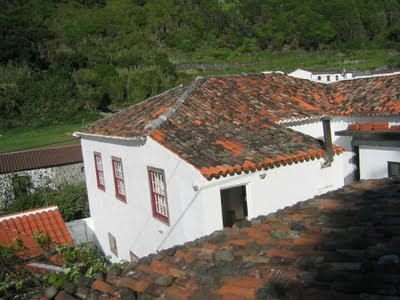 |
| "My back door looks too fat ..." |
Wednesday, 22 June 2011
Morangos com Açucar
It's Portuguese for "Strawberries with Sugar" and is the name of a long running kids' soap opera on Portuguese TV - it's sort of half way between Grange Hill and Hollyoaks.
During the school summer holidays, it becomes Morangos com Açucar - Férias de Verão ("Summer Holidays") when the cast decants from their school in Lisbon to a resort on the Algarve and take their clothes off. Well not all of the cast: girls with fat thighs and hairy moles - only included in the fully clothed winter version of McA in a token nod in the direction of diversity - are left behind with the fat boys. If there were a summer holidays version of Eastenders, then Heather ('Ev) Trott would not be in it. Nor would Shirl or - and now I come to think of it, anybody. Not since Kara Tointon left, anyway ...
Thus, Anabela is guaranteed a suntan in Cascais this summer:-
... whereas Papoila can look forward to a summer of wiping tables at a motorway service station north of Santarem
Anyway, I've digressed - how did I get on to this? Oh yes, Morangos, naturally I have no interest whatever in watching skimpily clad teenage girls (especially once the fat and unattractive ones have been weeded out leaving only the svelte ones with tight sweaters and short skirts (Ooh! Suits you! Ooh!) for the middle aged viewer's delectation), no, it's because McA has CeeFax 888 subtitles and thus it's a good Portuguese lesson.
Seriously - tonight I learned that se não te importares means "if you don't mind" (said to someone you're on familiar terms with). And cheira tão bem means "smells really good" in the context of cooking. And if you think that's not very important to know, there are often lots of things cooking smelling really good (if you don't me mind saying) when you walk down the main street of Fajã Grande around lunchtime. In fairness, my Portuguese is not so bad that I didn't know that these expressions would be something like that but you always have to be careful that some idiom in English doesn't translate exactly into Portuguese. So it's great to be able to watch the subtitles on McA and get confirmation.
I wonder what's the Portuguese for "You're damn right it is" (Pois e?) in the context of the reply to "Do you think my arse is too fat to get a part in McA - Ferias de Verão?"
During the school summer holidays, it becomes Morangos com Açucar - Férias de Verão ("Summer Holidays") when the cast decants from their school in Lisbon to a resort on the Algarve and take their clothes off. Well not all of the cast: girls with fat thighs and hairy moles - only included in the fully clothed winter version of McA in a token nod in the direction of diversity - are left behind with the fat boys. If there were a summer holidays version of Eastenders, then Heather ('Ev) Trott would not be in it. Nor would Shirl or - and now I come to think of it, anybody. Not since Kara Tointon left, anyway ...
Thus, Anabela is guaranteed a suntan in Cascais this summer:-
... whereas Papoila can look forward to a summer of wiping tables at a motorway service station north of Santarem
Anyway, I've digressed - how did I get on to this? Oh yes, Morangos, naturally I have no interest whatever in watching skimpily clad teenage girls (especially once the fat and unattractive ones have been weeded out leaving only the svelte ones with tight sweaters and short skirts (Ooh! Suits you! Ooh!) for the middle aged viewer's delectation), no, it's because McA has CeeFax 888 subtitles and thus it's a good Portuguese lesson.
Seriously - tonight I learned that se não te importares means "if you don't mind" (said to someone you're on familiar terms with). And cheira tão bem means "smells really good" in the context of cooking. And if you think that's not very important to know, there are often lots of things cooking smelling really good (if you don't me mind saying) when you walk down the main street of Fajã Grande around lunchtime. In fairness, my Portuguese is not so bad that I didn't know that these expressions would be something like that but you always have to be careful that some idiom in English doesn't translate exactly into Portuguese. So it's great to be able to watch the subtitles on McA and get confirmation.
I wonder what's the Portuguese for "You're damn right it is" (Pois e?) in the context of the reply to "Do you think my arse is too fat to get a part in McA - Ferias de Verão?"
Subscribe to:
Posts (Atom)





















